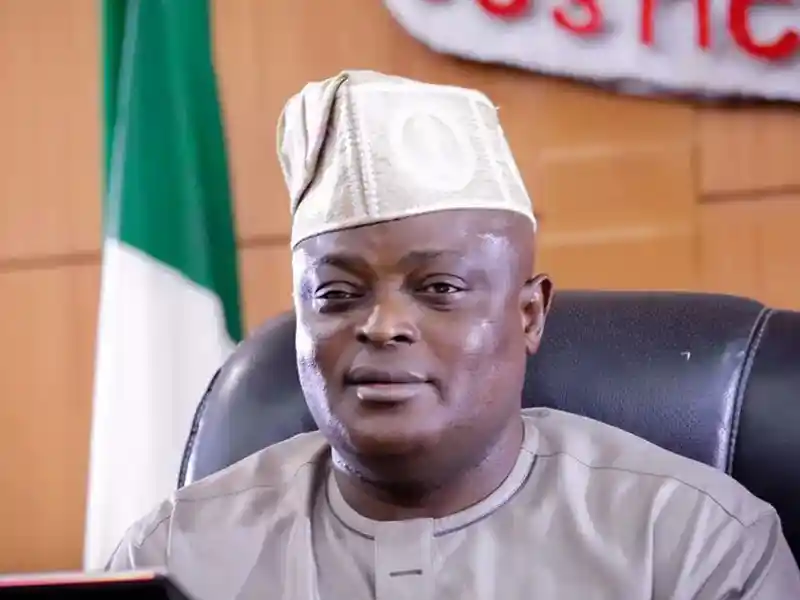Obasa Drags Lagos Assembly, Meranda to Court Over Removal: Seeks Urgent Hearing
- Advertisement -
The former Speaker of the Lagos State House of Assembly, Mudashiru Obasa, has initiated legal action against the Assembly and the newly elected Speaker, Mojisola Meranda, before the Lagos State High Court in Ikeja. Obasa is challenging the legality of his removal, which occurred while the Assembly was on recess.
In the suit, which is yet to be assigned to a judge, Obasa is requesting a court declaration that the actions of his colleagues were unlawful. He claims that his removal on January 13, 2025, was carried out without due process.
Obasa’s Legal Claims and Demands
- Advertisement -
The application, dated February 12, 2025, and filed by Obasa’s lawyer, Chief Afolabi Fashanu (SAN), outlines the former Speaker’s grievances and demands. Obasa argues that:
- His impeachment was conducted by 36 lawmakers out of 40 while he was out of the country.
- The Assembly convened and made critical decisions during recess without his consent or delegation of authority.
Obasa is seeking the following court orders:
- Advertisement -
- Accelerated Hearing: A request for the court to set a date for expedited proceedings.
- Time Limitation for Responses: The plaintiff requests that the defendants respond with counter-affidavits or written addresses within seven days of the hearing.
- Reply Deadlines: Obasa also seeks to limit the time for him to file his replies to three days after receiving the defendants’ responses.
The suit is based on the interpretation of the Constitution of the Federal Republic of Nigeria, 1999 (as amended) and the Rules and Standing Orders of the Lagos State House of Assembly.
Constitutional Issues Raised by Obasa
- Advertisement -
Central to Obasa’s case is the interpretation of constitutional provisions regarding the Assembly’s authority during recess. The former Speaker contends that:
- The Assembly’s proceedings during recess were unconstitutional because the session was not convened by him or through a delegated authority.
- His removal did not follow due process, violating both the Nigerian Constitution and the Assembly’s internal rules.
Obasa emphasized the need for an urgent resolution to prevent further disruptions to legislative activities in Lagos State.
Events Leading to Obasa’s Impeachment
Obasa was removed from office on January 13, 2025, by a two-thirds majority vote of the 40-member Lagos State House of Assembly. The impeachment came after allegations of misconduct and other offenses. Following his removal, Deputy Speaker Mojisola Meranda was immediately elected as the new Speaker.
- Advertisement -
Meranda’s election marked a historic moment, as she became the first female Speaker of the Lagos State House of Assembly.
Upon his return to Nigeria on January 25, 2025, Obasa was greeted by supporters at a rally held at his residence in GRA, Ikeja. In his address to supporters, Obasa maintained that he was not afraid of being impeached but asserted that the process used to remove him was flawed.
Allegations of Security Interference
Obasa has also accused the Lagos State Commissioner of Police of aiding his removal. He claimed that security agents, led by the commissioner, stormed the Assembly complex and his residences in Agege and Ikeja during the impeachment process.
According to Obasa, over 200 officers locked his family indoors during the operation. He described the actions as intimidation and abuse of power, which he believes were part of a coordinated effort to remove him unlawfully.
Obasa has publicly denied allegations of misappropriation or misconduct, insisting that his removal was politically motivated.
Public Reactions and Implications
The case has sparked significant public interest, with many Nigerians following the developments closely. Some political analysts believe that the outcome of the case could set a precedent for how legislative houses handle leadership changes during recess periods.
Supporters of Obasa have called for transparency and due process in legislative proceedings, while others have expressed optimism about Speaker Meranda’s leadership.
What’s Next?
As of now, no date has been set for the hearing of Obasa’s case. The Lagos State High Court is expected to determine whether the former Speaker’s claims have merit and whether the Assembly acted within its constitutional powers.
The case underscores the importance of adherence to constitutional provisions and internal rules in legislative matters. Regardless of the outcome, the decision will likely have a lasting impact on the dynamics of the Lagos State House of Assembly.
Final Thoughts
The legal battle between former Speaker Mudashiru Obasa and the Lagos State House of Assembly highlights the complexities of Nigeria’s political landscape. As the case unfolds, it serves as a reminder of the need for transparency, due process, and accountability in governance.
Stay tuned to our blog for updates on this developing story and other political news from Lagos State and beyond. Don’t miss out—bookmark this page for future updates on Nigeria’s political and legislative affairs.
- Advertisement -


